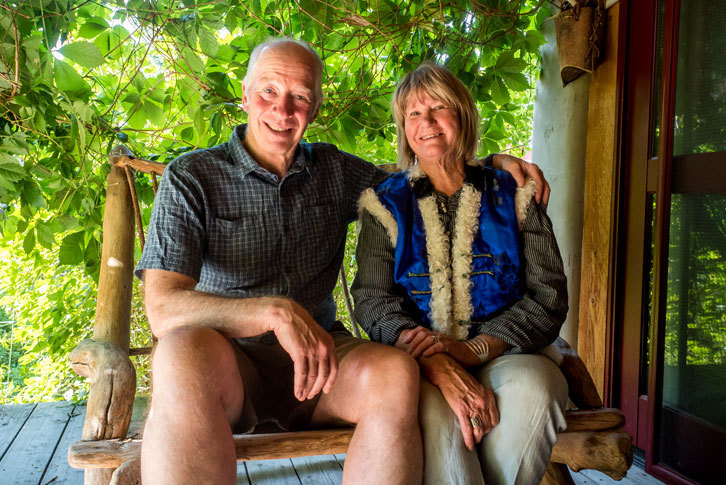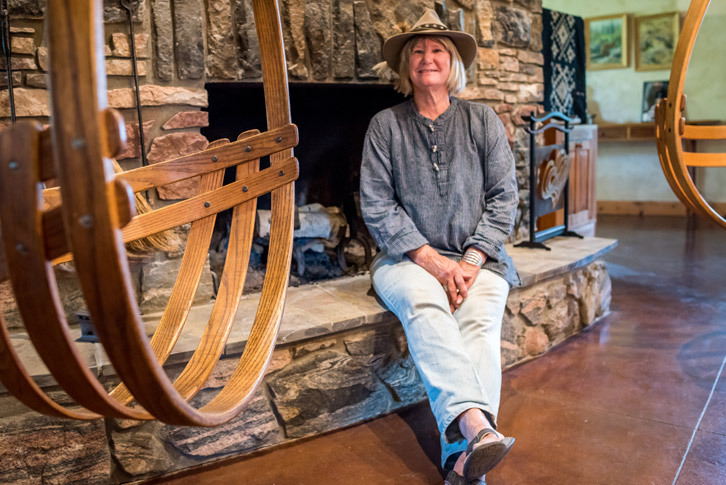In the Bozeman, Mont., home of Joan Weed Montagne ’67, there’s a wooden door with a large glass panel on which a spider web spirals out to fill almost the entire space. Joan’s father, famed furniture maker Walker Weed, built the door in memory of her mother, Hazel, a talented weaver, but it could well represent Joan’s own expansive life. She inherited her parents’ trait of embracing different cultures, and since her childhood in Gilford, N.H., she’s lived a year each in Norway and Japan. For the past 20 years, she’s focused on BioRegions International, the nonprofit she founded with her husband, Cliff, and its work connecting rural Mongolia with the Greater Yellowstone Ecosystem.
A spider’s silk, they say, is stronger than steel, and so is the independent Joan — she grew up hiking New Hampshire’s Presidential Range and skiing Tuckerman’s Ravine with her father. Though free with him to climb as high and ski as fast as she liked, she felt strapped down in New England, where, Joan still feels, too much importance is placed on where individuals attend school, what their fathers do and the clubs they belong to.
Though Joan says a part of her will always miss New England, perhaps it was fate she fell in love with a Westerner.

East meets West
Cliff Montagne took the train from Bozeman to Dartmouth College. He wore his cowboy boots and hat on the Hanover campus, but his closet also included plenty of ski gear. He and Joan met when she saw the skis on his Volkswagen Bug and asked him about conditions at Tuckerman’s Ravine. It turned out that her father was his father’s commanding officer in the Army’s 10th Mountain Division, and both men were Dartmouth College alumni.
Cliff majored in geology, the first step on his path to becoming a professor of land resources and environmental sciences at Montana State University (MSU), while Joan gravitated to sports at Colby Junior on her way to a degree in liberal arts — Joan was on the first U.S. Women’s Nordic Ski Team and practiced behind Sawyer Center. He was in ROTC, and she slipped daisies into rifle barrels to protest the escalating war in Vietnam. She chafed at required church attendance and having to be in her dorm room by 10 p.m., and he told her about Montana’s wide-open spaces.
“I used to spend a lot of time studying at [Professor] Hilary Cleveland’s house, but mostly I was roaring around to see Cliff,” Joan said. “I went into VISTA after I graduated and was in Upper Michigan with the Menominee Indians for six months; after we got married, I worked in the graphic design studio at Dartmouth. We moved out to Montana the minute Cliff graduated in 1969, and I very quickly became a Westerner.”
Joan earned a bachelor’s degree in religion and philosophy at MSU, and the Montagnes had a daughter. Joan joined and led several boards focused on environmental, community and social justice issues, and she shared her view that there is much more to the world than what’s contained within the United States’ borders. When she walks through downtown Bozeman, people know her and where she stands — she did, after all, earn an award for most letters written to the local paper’s editor.
Where Joan stands most firmly is with Cliff at the center of an intricate web devoted to raising people from the ground up.

West Goes Far East
When Cliff traveled to the new democracy of Mongolia for the first time in 1996, he realized it was in many ways just as Montana and the Greater Yellowstone Ecosystem had been 150 years before, with its struggles over land use and grazing rights, preserving native culture and the ramifications of mining.
He and Joan also realized that the land-locked regions’ similar cultural values, economies and natural environments — and their similar challenges — provided opportunities to learn from each other.
Thus was born, in 1998, their regional development nonprofit BioRegions International (bioregions.org), with a mission of supporting community-based endeavors that are holistic and promote social and ecological integrity.
Over the past two decades, BioRegions International has worked in Mongolia with students, educators, health professionals and others to build literal and figurative bridges; establish a self-supporting pharmacy and annual health screenings; provide environmental science and management training, as well as first-aid training; fund school renovations and improvements, including solar installations; supply about 2,000 pairs of prescription and reading glasses; fund artisan development programs and festivals showcasing traditional arts and music; and conduct water quality, nutrition and agriculture revegetation studies.
The Montagnes live in Mongolia two months of each year in backpacking tents, and Joan credits two criteria with BioRegions’ success: working only at the invitation of a community and staying with that community.
“We watch all these organizations pour in millions of dollars and the programs die because they don’t come from the community,” she said. “We won’t do anything unless the community really wants to do it, and while most NGOs are in a country for one or two years, we’ve been in Mongolia for 20 now and everything is bottom up rather than top down.”
The approach is a change in the former Soviet nation, but the Montagnes see that Mongolians want help learning how to make creative, innovative decisions and exert initiative.
“Some of the beauty is the potential for the Mongolians to learn from us, because we’re a century ahead in some ways, but then for us to learn from them, because we can still see a traditional society that has those values and a more sustainable lifestyle,” Joan said. “The potential is high for Mongolia to have an intact society and continue to respect the environment and then bring the technological benefits to move a society into a more sustainable place environmentally and socioeconomically.”
The learning continues, up close and personal, for the Mongolians, the Montagnes and the students they invite to experience the nomadic, animal-based culture.
“The new way of learning, I think, is hands-on instead of reading out of textbooks,” Joan said. “Get your degree and go out and serve. You’ve got to keep stoking the fire.”
Half a century later and almost a continent away from her alma mater, Joan’s advice, and the life that she has spun, echoes the Latin motto that is part of Colby-Sawyer’s seal: Paratae servire — prepared to serve.